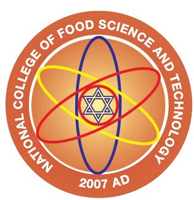Overview
Bachelor of Technology (B.Tech) in Food Technology – NCFST, NIST Higher Education, Lainchaur, Kathmandu
B.Tech (Food Technology) at the National College of Food Science and Technology (NCFST), NIST Higher Education, Lainchaur, Kathmandu, runs under Tribhuvan University’s Institute of Science and Technology. Official program governance and entrance administration are handled by IOST and its subject committees.
Program: B.Tech (Food Technology)
Affiliation: Tribhuvan University (TU), Institute of Science and Technology
Host Unit: National College of Food Science & Technology (NCFST), NIST Higher Education, Lainchaur, Kathmandu
Academic System: Four years, eight semesters under TU-IOST (semester transition announced by IOST; model questions and syllabus hosted on official portals).
Highlights
-
University governance: Entrance, syllabus updates, and model questions are published through TU-IOST and the Central Department/Subject Committee.
-
Semester structure: The program operates on a semester schedule (first/second semester materials referenced by TU’s campus/department sites).
-
Campus listing: NIST lists B.Tech (Food) at NCFST, Lainchaur, with contact window and program details for prospective students.
Curriculum Details
The curriculum builds a clear progression from science fundamentals to product-level operations, quality systems, and project work. TU-IOST releases model questions and semester references that outline expectations for theory, practicals, seminars, and assessment.
Foundations (early semesters)
-
Basic sciences and engineering: Applied chemistry, physics, mathematics, and introductory engineering for food processes.
-
Food science core: Food chemistry, food microbiology, unit operations, and material balances oriented to food systems.
-
Laboratory practice: Aseptic technique, media preparation, basic analytical methods, instrument familiarization, and notebook discipline.
Process and product (middle semesters)
-
Food process engineering: Thermal processing, drying, evaporation, freezing, and equipment fundamentals relevant to Nepal’s processing landscape.
-
Product technologies: Cereals, dairy, fruits and vegetables, meat/fish/egg, fats and oils, confectionery; unit-level control points and yield/quality considerations.
-
Quality & safety: Food laws and standards, HACCP principles, documentation basics, internal checks, sampling plans, and test method selection.
Systems, scale-up, and project (senior semesters)
-
Plant operations: Layout concepts, utilities, cleaning and sanitation, packaging basics, store/dispatch records, and waste management.
-
R&D and product development: Bench-scale trials, sensory sessions, shelf-life indications (pilot-scale where available).
-
Project/dissertation: A supervised project with written report and viva aligned to semester rules.
Academic references: IOST entrance/model-question section and TU campus/department syllabus pages confirm semester materials and assessment culture.
Objectives
-
Build a science-based understanding of food composition, processing, preservation, and safety suitable for regulated environments.
-
Develop practical skills for laboratory analysis, pilot-scale trials, documentation, and basic troubleshooting in plants and labs.
-
Support industry-relevant problem-solving and clear technical communication for early professional roles or further study.
Scope
Graduates apply their learning in food production units, quality control laboratories, packaging operations, and testing facilities. Roles also extend to food hygiene/surveillance teams, service labs, and entry-level R&D or sensory units subject to employer requirements. TU and IOST maintain program oversight; the Central Department engages with curriculum and model-question releases that reflect ongoing updates.
Learning Outcomes
Students completing the degree should be able to:
-
Interpret food composition and process data to explain changes during heating, drying, freezing, and storage.
-
Operate routine lab workflows with accurate records, simple statistics, and result interpretation suitable for internal QC.
-
Prepare concise SOP-style notes, deviation logs, and batch-wise summaries aligned with plant or lab requirements.
-
Present project outcomes with evidence (tables/figures), references, and a clear narrative for viva and reporting.
Skill Development Modules
-
Laboratory practice: Aseptic technique; media preparation; pH, moisture, acidity; basic titration; instrument use logs; calibration notes.
-
Documentation: SOP drafting, test request forms, sampling plans, and internal QC sheets.
-
Process observation: Line checks, equipment ID, simple mass/energy estimates, and CCP/PRP mapping under supervision.
-
Communication: Short technical memos, project abstracts, posters, and viva preparation.
Teaching Methodology
NCFST follows TU-IOST norms for semester teaching and internal checks. Delivery blends lectures, demonstrations, structured practicals, seminars, and project guidance. Internal assessment usually includes short tests, lab notebooks, and presentations prior to semester examinations. Departmental and campus pages host syllabi/model questions to align classroom work with university assessment.
Admission Requirements
Eligibility (as per TU-IOST policy and NIST listing):
-
Academic background: I.Sc. or 10+2 (Science) in second division, or certificate level in Food Technology/Laboratory Technology from TU or a TU-recognized institute.
-
Entrance: IOST conducts the B.Tech (Food Technology) entrance. Applicants must follow the official call, apply on the IOST portal, and sit the exam; a merit list governs admission across constituent and affiliated campuses.
-
Documentation: Application form, photographs, academic transcripts/mark sheets, character/migration certificates, and entrance score sheet as specified in the session-wise notice.
Note: Annual/semester policy has transitioned under IOST. Official references and campus pages indicate first/second semester syllabus and model questions; applicants should confirm the current session notice for any changes in structure or pass rules.
Career Opportunities
-
Quality Control/Assurance: Routine analysis, documentation, sampling, and internal audit support in processing units.
-
Production & Operations: Line support for mixing, heating, drying, packaging, and sanitation schedules.
-
Testing & Service Labs: Sample receipt, basic microbiology/chemistry work, and report drafting under supervision.
-
Packaging & Storage: Specifications, storage checks, shelf-life monitoring, and deviation notes.
-
Entry-level R&D/Sensory: Bench trials, data summaries, and participation in product panels.
Employers include food manufacturers, dairies, beverage plants, bakeries, oil and cereal processors, third-party labs, and sectoral service units.
Scholarships and Financial Aid
Policy window: IOST scholarship procedures apply at the university level; campuses also communicate session-wise merit provisions during intake. Prospective students should verify current scholarship notes during admission at NIST (Lainchaur).
Why Choose This Course?
You study a TU-IOST governed food technology degree with semester delivery, official entrance procedures, and publicly available model questions/syllabus references. The Lainchaur location connects students to Kathmandu’s laboratories, agencies, and processing units for industry visits or coordination consistent with policy and availability. The NIST program page lists B.Tech (Food) at NCFST with contact details for timely queries.
Conclusion
B.Tech (Food Technology) at NCFST, NIST Higher Education, provides a science-anchored path into Nepal’s food sector under TU-IOST oversight. The curriculum moves from fundamentals to plant-level practice and a guided project, promoting data-based decisions, safe operations, and clear reporting. Semester references and official model questions help you prepare for assessments while building skills expected by processing units and service labs.
FAQ
Q1. Is the B.Tech (Food Technology) under the semester system at TU-IOST?
IOST communicated the shift from the annual system to the semester system; TU campus/department pages host first/second semester syllabus and model-question references.
Q2. Who conducts the entrance examination and where are model questions available?
IOST conducts the entrance. Model questions are posted on the official IOST Downloads page.
Q3. What minimum qualification is required to apply?
Applicants need I.Sc./10+2 (Science) in second division or a certificate level in Food Technology/Lab Technology recognized by TU, followed by the IOST entrance and merit listing.
Q4. Where can I confirm program availability and contact details for NCFST (Lainchaur)?
The NIST Higher Education site lists B.Tech (Food) at NCFST with address, office hours, and program links.
Q5. How are internal assessments handled?
Internal checks include class tests, lab notebooks, and presentations aligned to semester examination rules issued via TU-IOST and campus departments. Refer to semester syllabus/model-question sections for current expectations.



















